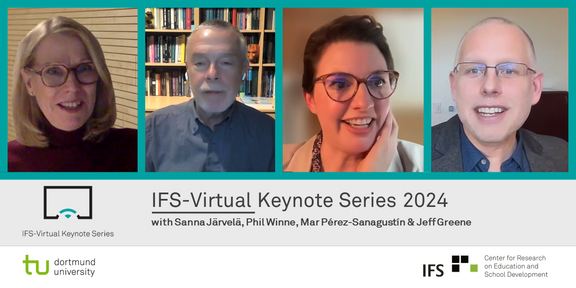IFS-Virtual Keynote Series AI in the educational context has successfully taken place
- News
- Events

As part of the 4th IFS-Virtual Keynote Series on the topic of "Challenges and Potentials of Artificial Intelligence in Education Research and in the Classroom", four internationally renowned researchers gave keynote speeches on their current research findings.
On January 22, Professor Sanna Järvelä from the University of Oulu gave a lecture on "Advancing socially shared regulation in collaborative learning with AI". She showed how multimodal analytics and AI-based methods have helped to advance research on socially shared regulation of learning (SSRL). The second keynote was given by Professor Phil Winne from Simon Fraser University on the topic of "How can AI help self-regulated learners learn?" and focused on AI in the classroom context. He came to the conclusion that AI has the potential to design better instruction than instructors, but that learning cannot be increased beyond what self-regulated learners can achieve. On January 29, Professor Mar Pérez-Sanagustín from the Université de Toulouse addressed the question of how AI can be used to improve learning in schools and educational research in her lecture on "Hybrid intelligence: a new research paradigm for educational research". The second lecture of the day was given by Professor Jeff Greene from the University of North Carolina. His presentation on "Artificial intelligence, real learning?" addressed the question of how the use of artificial intelligence can help to capture and improve real learning outcomes.
The keynotes were followed by lively discussions with participants from numerous countries about the influence and interaction of artificial intelligence. Many thanks to everyone for their participation and the exciting exchange!





![[Translate to English:] [Translate to English:]](/storages/ifs-ep/_processed_/3/0/csm_iStock-1180187740_Orbon_Alija_bc1514e180.jpg)